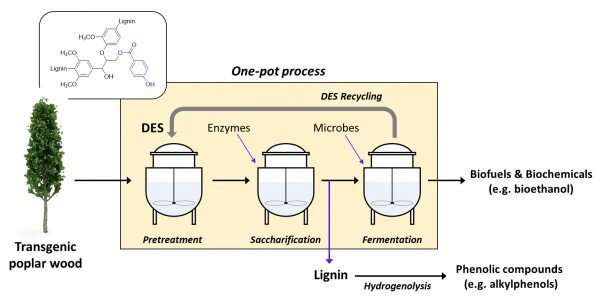One-pot process for producing biofuels and biochemicals from biomass using environmentally friendly eutectic solvents Credit: Korea Institute of Science and Technology. Green Chemistry (2022). DOI: 10.1039/D2GC02774G
Biomass refers to biological organisms, including plants, that synthesize organic matter utilizing solar energy and animals that use these plants as food. Biomass also includes resources that can be converted into chemical energy. To achieve carbon neutrality by 2050, substantial efforts have been made worldwide to develop biorefinery technology that can replace fossil fuels with biofuels. However, the conventional biofuel production process involves the use of highly toxic solvents, which are mainly derived from petroleum causing environmental and economic concerns.
Dr. Kwang Ho Kim's research team at the Clean Energy Research Center of Korea Institute of Science and Technology (KIST) developed a green solvent that can completely replace conventional petrochemical-based solvents while maximizing the efficiency of biofuel production. The researchers announced that it is now possible to produce sustainable and economically secured biofuels. The study is published in the journal Green Chemistry.
After screening various solvent candidates, the KIST research team synthesized a green deep eutectic solvent that is also biocompatible with microorganisms during the fermentation process. The synthesized eutectic solvents were systematically analyzed by advanced nuclear magnetic resonance spectroscopy and computational analysis.
The "one-pot process" based on the newly developed solvent maximized the production efficiency of high-purity biofuels and biochemicals by integrating three to four existing complex processes into one consolidated process. It was also announced that the one-pot process that uses environmentally friendly solvents is sustainable, does not emit pollutants, does not require washing water and allows for the reuse of solvents.
Dr. Kim of KIST said, "By overcoming the uneconomical problems currently being faced by the biorefinery industry via the development of green solvents and maximization of biofuel production process efficiency, Korea will be able to take the lead in the 'Race to Zero' by developing this sustainable technology."
More information: Kwang Ho Kim et al, One-pot conversion of engineered poplar into biochemicals and biofuels using biocompatible deep eutectic solvents, Green Chemistry (2022). DOI: 10.1039/D2GC02774G
Journal information: Green Chemistry
Provided by National Research Council of Science and Technology
























